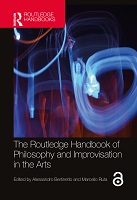The Routledge Handbook of Philosophy and Improvisation in the Arts
Proposal review

Contributor(s)
Bertinetto, Alessandro (editor)
Ruta, Marcello (editor)
Language
EnglishAbstract
The idea of improvisation, broadly defined, has been integral to our imagination of the medieval musical past. It can be related to many elements of production: to the act of un-notated creation; to the manipulation and amplification of notated materials; to our observance of rigid rules and formulae; or to spontaneous freedom. Likely a product of the Carolingian Renaissance, this is the first medieval music treatise to address an aspect of chant performance that does not only relate to a memorized repertoire, but includes an unwritten practice of extemporizing an accompanying voice to a pre-given melody. The art of “coloration” or the ornamentation of a line, whether polyphonic or monophonic, had been an integral part of extemporization since at least the time of the Ad organum faciendum treatises. When planning author's ontological inquiries, the author's would do well to remember the possible existence of creativity that is not inspired, or ephemerality that is not performer- or expression-centered.
Keywords
Philosophy, Ontology, Music, Improvisation, Arts, PerformanceDOI
10.4324/9781003179443ISBN
9780367203641, 9781032016498, 9781003179443Publisher
Taylor & FrancisPublisher website
https://taylorandfrancis.com/Publication date and place
2021Imprint
RoutledgeClassification
Philosophy
